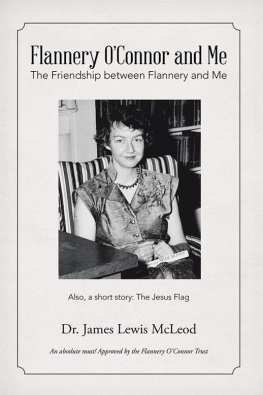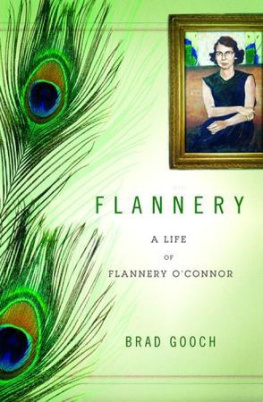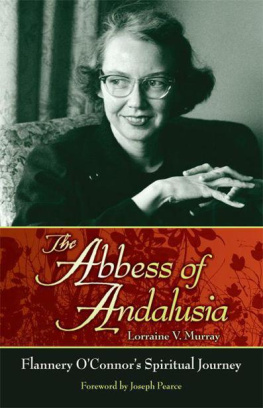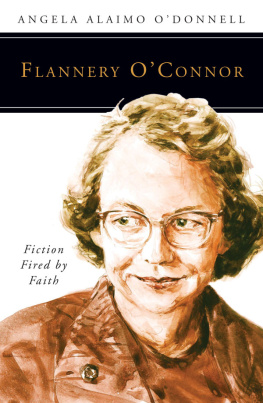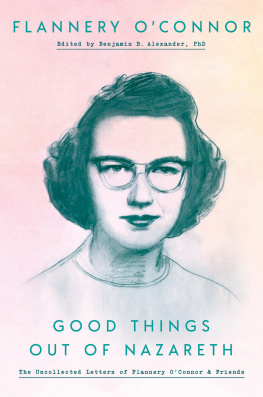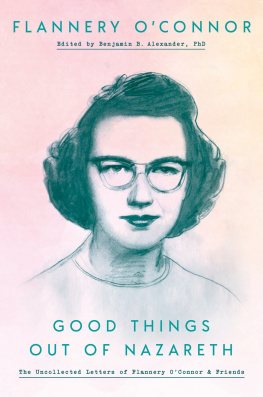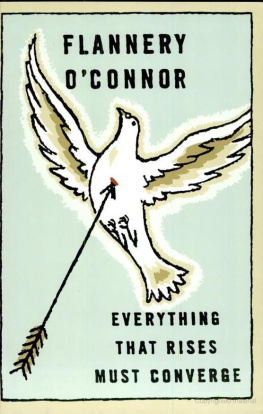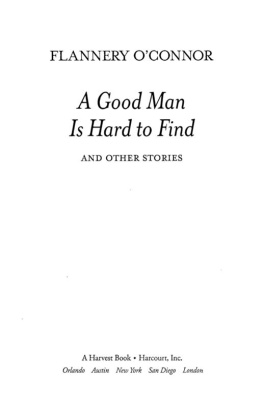The author wishes to thank the charitable trust of Mary Flannery OCo nnor.
FLANNERY OCONNOR AND ME
The Friendship between Flannery and Me
Also, a short story: The Jesus Flag
Freeze, freeze thou bitter sky,
Thou dost not bite so nigh, As benefits fo rgot:
Though thou the waters warp, Thy sting is not so s harp,
As friend rememberd not.
William Shakesp eare,
Amiens Song
As You Like It
Dr. James Lewis McLeod
Copyright 2017 by Dr. James Lewis McLeod.
Library of Congress Control Number: 2017911128
ISBN: Hardcover 978-1-5434-0237-7
Softcover 978-1-5434-0236-0
eBook 978-1-5434-0235-3
All rights reserved. No part of this book may be reproduced or transmitted in any form or by any means, electronic or mechanical, including photocopying, recording, or by any information storage and retrieval system, without permission in writing from the copyright owner.
Scriptures taken from The Holy Bible, King James Version. Cambridge Edition: 1769; King James Bible Online, 2017. www.kingjamesbibleonline.org .
Any people depicted in stock imagery provided by Thinkstock are models, and such images are being used for illustrative purposes only.
Certain stock imagery Thinkstock.
Rev. date: 08/16/2017
Xlibris
1-800-455-039
www.Xlibris.com .au
763110
CONTENTS
T HE SOUTHERN AUTHOR Flannery OConnor (19251964) lived in Milledgeville, Georgia, during the last years of her life when I knew her. Flannery lived with her mother, Regina Cline OConnor, at their farm just outside of town Andalusia, which is an historic tourist site today. I have included two letters I received from Flannery both personal and instruc tive.
Flannery stayed with her mother because in her last years, Mary Flannery, as her Southern belle mother called her in the Southern fashion, had a very serious disease, lupus, which eventually claimed her life in 1964. Her father had died of the same disease, and it was gen etic.
What you really need to know about Milledgeville is, in the 1950s and early 1960s, Milledgeville had been the state capital of Georgia before the War Between the States. After the War, many still called it then, the capital of the state was moved to Atlanta, but much pleasant ante-bellum architecture was left behind. The small town was full of high-columned, two-story white houses, while the people living in them prided themselves on a lifestyle of Southern manner and genti lity.
Because of the withering lupus, which placed Flannery on straight steel crutches before the end, Flannery had to return from the North, where she had been living and writing, to her home in Milledgeville, where her widowed mother, Regina Cline OConnor, could look after her.
Flannery had to have constant supervision and care. That care was furnished by Regina OConnor, her mother. After Flannerys funeral in 1964, at which I was a pall bearer, Regina told me the one consolation about her thirty-nine-year-old daughters early death was that if she, Regina, had died first, who would have looked after Flannery? Regina said that worried her a great deal as it certainly would have worried any mother in a similar situa tion.
Outside of Milledgeville was the Cline-OConnor farm. To reach the frame farmhouse, you drove up a hill and over a long red-clay-and-gravel driveway that had green pastures on either side. I can always remember a seated Flannery waving in welcome from her rocking chair on the house veranda as I drove up on many visits to her.
While seated in a rocking chair on the veranda overlooking the sloping hills, nearly every visitor enjoyed a sense of rural peace and serenity. I often found myself there on summer afternoons and evenings. I would be seated in a rocking chair on the veranda, gently rocking and talking with Flannery. Sometimes Regina, her mother, was pre sent.
When Regina was present on the veranda, the conversation took a more gossipy and provincial level than the better times I enjoyed most was when Flannery and I talked about writing, literature, religion, history, the ironies of life, or anything else we wanted to talk about. We often rocked and talked as we watched the beautiful sunset change the colors of the night aroun d us.
The way I came to know Flannery began with the fact my father and Regina sat on the towns Red Cross together. The Red Cross appealed to them both as a worthy cause that their community should back. Now Regina was a devout Roman Catholic, as was Flannery, and my father was minister of the First Presbyterian Church in town. But that made no difference to either. They had a meeting of the minds on the good of the Red Cross and cha rity.
Regina, a small and delicate lady, in the fashion of old-time Southern belles, of which she was one if ever there was one, always carried in her hand a dainty lace handkerchief. This handkerchief sailed around her because she gestured with it as she talked. My father wore a gray Fedora hat, which bobbed up and down as he nodded in agreement with someone. The two talked o ften.
In my memory, I can see the two of them talking after meetings on the Red Cross steps. How amused I was to see her white handkerchief sail and dot the air as if performing semaphore along with her words. My fathers hat bobbed up and down in the air as he nodded and agreed with her implicitly. Later my father often said to me that Regina had a good business sense as any man and much better than most men. That she did. She was a born manager. Regina often later said to me that my father was a handsome man. That he was. The two got along famo usly.
I was a student in 1956 at Washington and Lee University in Virginia, when I first heard about Flannery OConnor, the writer. A short story of hers, A Stroke of Good Fortune, had appeared in the Shenandoah , the literary magazine of Washington and Lee in 1953.
My freshman English classes at Washington and Lee were quite good. A teacher there, Ashley Brown, had done literary evangelism for Flannery in the English Department. All the English teachers knew of Flannery, which was very good and clever of them at the time, as Flannery was not well known at all in 1953. Many friends from my prep school who had gone to other well-known colleges had not heard of her at all at the time when I mentioned her. I have always felt how lucky I was to have gone to Washington and Lee.
After an English teacher heard that I was from Milledgeville, Georgia, he asked me if I knew OConnor. I did not. But he said I should and that I should read her in a past issue of the college literary magazine. I did so. I read her short story Stroke of Good Fortune. I didnt know exactly what I was supposed to feel, but whatever, I laughed and laughed and laughed, and I said to myself that I had to meet her. Here was a real-life lady.
I asked my father when I came home for a weekend if he knew one Flannery OCo nnor.
He thought a little. Of course, he said, thats Mary Flannery, Reginas daughter. She sits on the Red Cross with me. Then he paused and said, Mary Flannery writes, I t hink.
I said she did and I wanted to meet her. He said he would be happy to arrange it. No pro blem.
In Milledgeville, there was one good restaurant, the Sanford House, in an elegant antebellum mansion. It was run and owned by Miss Fannie Appleby White and a younger friend, Mary Jo Thompson. The OConnors often ate there, as did my family. Miss White was a good friend of Regina OConnor. In fact, Mary Jo and Miss White often spent their weekends with Flannery and her mother at their Andalusia farm.
To make matters better, Mary Jo was a friend of my mother, and Miss White was a member of the Presbyterian Church, taught Sunday School there for years, admired my fathers sermons, and was clever enough to tell him so regularly. When my mother, who had heard I wanted to meet Flannery, said that was easy and explained the social situations to me, I knew I was in like Flynn. I would meet Miss OConnor. So I began reading everything of Flannerys I could find.
Next page
